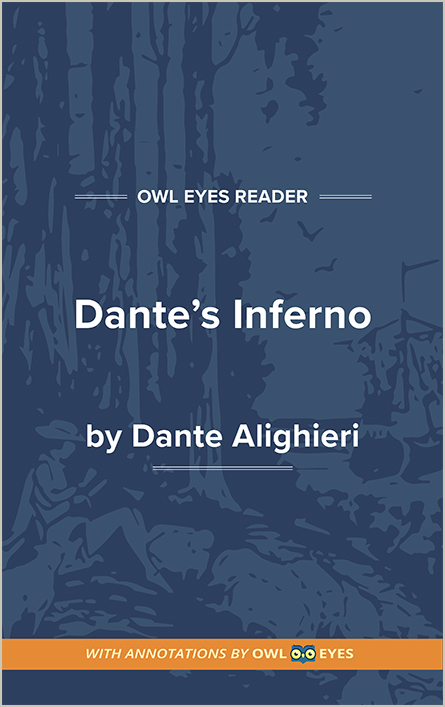Analysis Pages
Allusion in Dante's Inferno
Allusion Examples in Dante's Inferno:
Canto 1
🔒"Have conn'd it o'er..." See in text (Canto 1)
"A lion came, 'gainst me..." See in text (Canto 1)
"a panther, nimble, light, And cover'd with a speckled skin, appear'd..." See in text (Canto 1)
"For whose fair realm, Camilla, virgin pure, Nisus, Euryalus, and Turnus fell..." See in text (Canto 1)
Canto 2
🔒"To Lucia calling..." See in text (Canto 2)
"Rachel..." See in text (Canto 2)
"Thou hast told that Silvius' sire..." See in text (Canto 2)
Canto 4
🔒"When I beheld a puissant one arrive Amongst us, with victorious trophy crown'd..." See in text (Canto 4)
"seven gates..." See in text (Canto 4)
"Seven times with lofty walls begirt..." See in text (Canto 4)
"and by Camilla there Penthesilea..." See in text (Canto 4)
"Electra there I saw accompanied By many, among whom Hector I knew, Anchises' pious son..." See in text (Canto 4)
"The third is Naso..." See in text (Canto 4)
"Lucan..." See in text (Canto 4)
"Flaccus..." See in text (Canto 4)
"Israel with his sire and with his sons, Nor without Rachel whom so hard he won, And others many more, whom he to bliss Exalted..." See in text (Canto 4)
Canto 5
🔒"I would address those two together coming, Which seem so light before the wind..." See in text (Canto 5)
"The book and writer both Were love's purveyors..." See in text (Canto 5)
"Lancelot..." See in text (Canto 5)
"Tristan..." See in text (Canto 5)
"Helen..." See in text (Canto 5)
"The next in amorous fury slew herself..." See in text (Canto 5)
Canto 6
🔒"Consult thy knowledge..." See in text (Canto 6)
"Cerberus..." See in text (Canto 6)
Canto 7
🔒"So 't is will'd On high, there where the great Archangel pour'd Heav'n's vengeance on the first adulterer proud..." See in text (Canto 7)
Canto 10
🔒"From Josaphat return'd shall come, and bring Their bodies, which above they now have left. The cemetery on this part obtain With Epicurus all his followers, Who with the body make the spirit die..." See in text (Canto 10)
Canto 11
🔒"thy ethic page..." See in text (Canto 11)
Canto 12
🔒"Nessus is this, Who for the fair Deianira died..." See in text (Canto 12)
"Perchance thou deem'st The King of Athens here..." See in text (Canto 12)
"The infamy of Crete, detested brood Of the feign'd heifer..." See in text (Canto 12)
Canto 14
🔒"This of the seven kings was one, Who girt the Theban walls with siege..." See in text (Canto 14)
"good Mulciber..." See in text (Canto 14)
"the son Of Ammon..." See in text (Canto 14)
"The soil that erst by Cato's foot was trod..." See in text (Canto 14)
Canto 15
🔒"Verona's champain try their speed For the green mantle..." See in text (Canto 15)
"I commend my TREASURE to thee..." See in text (Canto 15)
Canto 17
🔒"ill-fated Icarus..." See in text (Canto 17)
"Phaeton..." See in text (Canto 17)
"Nor spread Arachne..." See in text (Canto 17)
Canto 19
🔒"Which against Charles thy hardihood inspir'd..." See in text (Canto 19)
"Jason shall be call'd, of whom In Maccabees..." See in text (Canto 19)
Canto 20
🔒"Carrara's hind..." See in text (Canto 20)
Canto 21
🔒"one of Santa Zita's elders..." See in text (Canto 21)
Canto 22
🔒"As dolphins, that, in sign To mariners..." See in text (Canto 22)
Canto 23
🔒"The present fray had turn'd my thoughts to muse Upon old Aesop's fable, where he told What fate unto the mouse and frog befell..." See in text (Canto 23)
"minor friars..." See in text (Canto 23)
Canto 24
🔒"The' Arabian Phoenix..." See in text (Canto 24)
Canto 25
🔒"What if in warbling fiction he record Cadmus and Arethusa, to a snake Him chang'd, and her into a fountain clear..." See in text (Canto 25)
"Lucan in mute attention now may hear, Nor thy disastrous fate, Sabellus! tell, Nor shine, Nasidius..." See in text (Canto 25)
Canto 26
🔒"Circe..." See in text (Canto 26)
"Caieta, ..." See in text (Canto 26)
"Elijah's chariot, when the steeds erect Rais'd their steep flight for heav'n; his eyes meanwhile, Straining pursu'd them..." See in text (Canto 26)
Canto 27
🔒"As the Sicilian bull, that rightfully His cries first echoed, who had shap'd its mould, Did so rebellow, with the voice of him Tormented, that the brazen monster seem'd Pierc'd through with pain..." See in text (Canto 27)
Canto 30
🔒"One is that dame The false accuser of the Hebrew youth..." See in text (Canto 30)
Canto 31
🔒"Ephialtes him they call..." See in text (Canto 31)
"Nimrod is this, Through whose ill counsel in the world no more One tongue prevails..." See in text (Canto 31)
"Saint Peter's Roman fane..." See in text (Canto 31)
"So terrible a blast Orlando blew not, when that dismal rout O'erthrew the host of Charlemagne..." See in text (Canto 31)
"Achilles and his father's javelin caus'd Pain first, and then the boon of health restor'd..." See in text (Canto 31)
Canto 32
🔒"Not more furiously On Menalippus' temples Tydeus gnaw'd..." See in text (Canto 32)
"Through Antenora roamest..." See in text (Canto 32)
"Not him, whose breast and shadow Arthur's land..." See in text (Canto 32)
Canto 34
🔒"banners of Hell's Monarch do come forth Towards us; therefore look," so spake my guide, "If thou discern him..." See in text (Canto 34)

